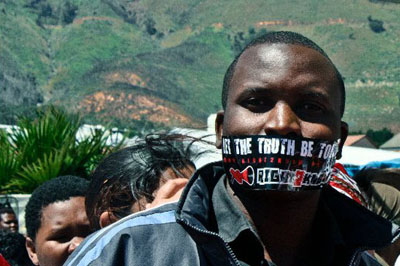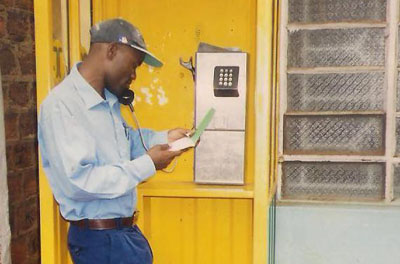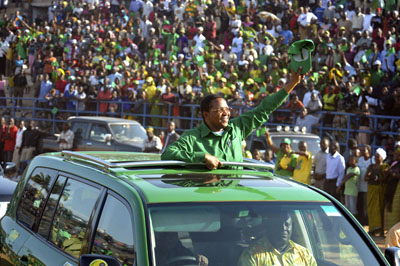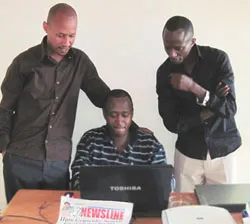Africa
2010
Uganda lifts ban on CBS, staff celebrates with caution
Full, normal broadcasting of the Ugandan Central Broadcasting Service (CBS)–owned by Uganda’s powerful traditional Buganda kingdom–resumed Monday after nearly 14 months of silence. While CBS staff welcomed their return to work, many recounted a tough year and questioned the nature of the station’s re-opening.

South Africans end week of “secrecy bill” protests
On Wednesday, just before South African lawmakers were scheduled to debate amendments to the controversial Protection of Information Bill, thousands of protesters marched to the gates of Parliament in Cape Town to oppose the measure, which they called an “apartheid-style secrecy bill.” The marchers represented a broad coalition of media, academia, trade unions and civil…

Kenyan journalist’s murder case postponed again
Kenyan journalist Francis Nyaruri went missing on January 16, 2009 after writing a series of articles for The Weekly Citizen about corruption and malpractice by local police and civil servants. Thirteen days later, his bound and decapitated body was found near his hometown of Nyamira, northwest of the capital city of Nairobi. Twenty-two months after…

Government threatens press in pre-election Tanzania
As the October 31 national elections draw near, Tanzania’s media is in a frenzy trying to cover the close race between the two leading presidential candidates. But government threats and draconian media laws may be getting in the way of objective coverage.
Protecting journalists from Firesheep
There’s been a great deal of coverage in the last day or so of Firesheep, a plugin for Firefox that lets you take over the Facebook and Twitter accounts of others on your local network. If you use Firesheep, you can pick one of the people on, say, the same open wireless at your nearby…

In South Africa, echoes of Black Wednesday
On October 19, 1977, South Africa’s government banned The World newspaper, along with Weekend World, the paper’s weekly magazine, and Pro Veritate, a Christian publication. Authorities also detained scores of activists and outlawed 17 anti-apartheid groups during the one-day crackdown, which came to be known as Black Wednesday.

South Africa weighs dropping media tribunal plan
For the first time in South Africa’s months-long debate over the proposal for a government-run media appeals tribunal, a top official from the African National Congress (ANC) indicated on Friday that the plan could be dropped altogether–under certain conditions.
Obiang prize suspended indefinitely
The Obiang prize, named for and funded by one of Africa’s most notorious dictators, was a very poor idea from the start and our goal, bluntly, was to kill it. We didn’t quite succeed in getting an outright cancellation, but the prize, while technically alive, is in a deep coma with virtually no chance of…

Censored in Rwanda, editors work from exile
Though it has been a dark year for Rwanda’s press, it has also been a year of resistance and turning to a new sort of reporting–from exile. Ever since Rwandan authorities began cracking down on the nation’s independent press before the presidential elections in August, the space for critical reporting has been dissipating.

In Gabon, censorship lingers from 2009 vote
In Gabon, more than a year after the historic and contested presidential elections won by Ali Ben Bongo Ondimba, the main radio and television stations of Ondimba’s two main opponents still face administrative obstructions imposed during the polls, according to interviews CPJ conducted with journalists and officials between July and September.